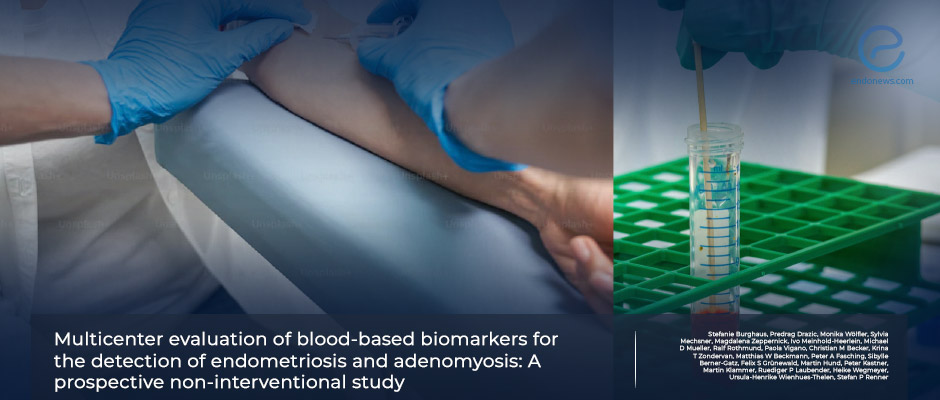Blood-based biomarkers for the detection of endometriosis and adenomyosis
Nov 17, 2023
Multicenter study evaluates blood-based biomarkers in hopes of finding a sensitive diagnostic test for endometriosis
Key Points
Highlight:
- The blood-based biomarkers do not have high sensitivity and therefore are not sufficient to detect endometriosis/adenomyosis.
Importance:
- There is a need for a noninvasive blood-based biomarker for an earlier diagnosis of endometriosis.
What's done here:
- This is a multicenter, prospective, non-interventional study aimed to assess the biomarkers with high sensitivity to detect endometriosis/adenomyosis.
- A total of 919 women undergoing laparoscopy or laparotomy with a suspicion of endometriosis/adenomyosis, revealed 741 confirmed endometriosis/adenomyosis cases.
- Seventeen autoantibodies with seven clinical variables were compared.
- Top-performing biomarkers were detected for each group using statistical analyses.
Key results:
- CA-125 and secreted frizzled-related protein 4 (sFRP-4) were the top-performing biomarkers when comparing “all-endometriosis cases” with “all symptomatic controls”.
- CA-125 concentration differences significantly increased with the endometriosis stage, particularly in Stages III/IV.
- Top-performing biomarkers when comparing “all-endometriosis cases” with “pathology-free symptomatic controls” were S100-A12 and CA-125.
- CA-125 was the top biomarker in the hormone intake and menstrual cycle phase subgroup analyses.
- None of the biomarkers or their various combinations showed high sensitivity as diagnostic tests for endometriosis and existing imaging techniques outperformed biomarkers.
Lay Summary
One of the biggest challenges in endometriosis management is the delay in diagnosis. Scientists have been trying to come up with biomarkers to detect it quicker. Thinking blood-based biomarkers could aid in earlier diagnosis and help with the duly administration of patient management procedures, researchers from various European countries led by Burghaus et al. conducted a multicenter prospective study with the aim of finding a highly sensitive biomarker to detect suspected endometriosis/adenomyosis. The study was published in the August 2023 issue of the International Journal of Gynecology & Obstetrics.
The study included women undergoing laparoscopy or laparotomy with a suspicion of endometriosis/adenomyosis. After surgery, they were subdivided into "cases" (endometriosis, endometriosis with adenomyosis, or adenomyosis only) or "all symptomatic controls" (without endometriosis or adenomyosis). A total of 17 autoantibodies as biomarkers and seven clinical variables were compared between the groups. Statistical analyses, including receiver operating characteristic curves and logistic regression, were employed to identify top-performing single biomarkers and combinations for distinguishing between cases and controls. The significance of endometriosis stage dependency for each biomarker was assessed.
There were 919 participants included in the study with 741 confirmed endometriosis/adenomyosis cases. Results showed that the top-performing biomarkers when comparing “all-endometriosis cases” with “all symptomatic controls” were CA-125 and secreted frizzled-related protein 4 (sFRP-4). Univariate analysis showed CA-125 as the highest-ranking biomarker in the subgroup analyses, particularly in the comparison with "all symptomatic controls”. CA-125 concentration significantly increased with the endometriosis stage. However, the authors discuss that CA-125 did not exhibit satisfactory performance for diagnostic or screening applications.
Top-performing biomarkers when comparing“all-endometriosis cases” with “pathology-free symptomatic controls” were S100-A12 and CA-125 with S100-A12 as the top univariate biomarker. However, the authors state that the area under the curve value of these biomarkers was also not sufficient. It was also added that existing imaging techniques outperformed biomarkers.
Research Source: https://pubmed.ncbi.nlm.nih.gov/37635683/
endometriosis adenomyosis blood-based biomarkers biomarker CA125

